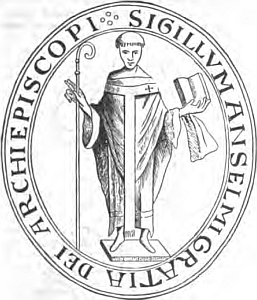 Anselm of Canterbury's (1033 – 1109) Cur Deus Homo (Why God Became Man) is particular famous for being the first concise statement of the "Satisfaction Theory of Atonement." Anselm's Satisfaction theory is the bedrock for all modern orthodox understandings of atonement, including the fullest expression in "Penal-Substitutionary Atonement." Anselm argues that the previous Ransom Theory of Atonement was deficient because it was not the Devil but God who was owed "ransom" (if that is the correct term.)
Anselm of Canterbury's (1033 – 1109) Cur Deus Homo (Why God Became Man) is particular famous for being the first concise statement of the "Satisfaction Theory of Atonement." Anselm's Satisfaction theory is the bedrock for all modern orthodox understandings of atonement, including the fullest expression in "Penal-Substitutionary Atonement." Anselm argues that the previous Ransom Theory of Atonement was deficient because it was not the Devil but God who was owed "ransom" (if that is the correct term.)
The short book contains many compelling arguments for Satisfaction. For instance, it requires a man to redeem men, so fallen angels are unable to be redeemed because God must necessarily to provide a sufficient atonement for angels in the same way that he had became a man to atone for men. Sins are explain in the terms of indebtedness and throughout Anselm's works he refers to evil as "non-being" or as "nothing." An evil doer is really someone who lacks good. So when a man sins, it is a debt that is owed to God, and the sinner must provide what is now lacking due to the debt, and this requires instant repayment of what is due.
Anselm's works built upon each other, so to understand Cur Deus Homo the previous works should be read before hand (fortunately most are brief and available online for free: ccel link). Here are a couple selections that are interesting to this work:
Cur Deus Homo, Chapter XXI
"How great a burden sin is."Anselm. Suppose that you did not owe any of those things which you have brought up as possible payment for your sin, let us inquire whether they can satisfy for a sin so small as one look contrary to the will of God.
Boso. Did I not hear you question the thing, I should suppose that a single repentant feeling on my part would blot out this sin.
Anselm. You have not as yet estimated the great burden of sin.
Boso. Show it me then.
Anselm. If you should find yourself in the sight of God, and one said to you: “Look thither;” and God, on the other hand, should say: “It is not my will that you should look;” ask your own heart what there is in all existing things which would make it right for you to give that look contrary to the will of God.
Boso. I can find no motive which would make it right; unless, indeed I am so situated as to make it necessary for me either to do this, or some greater sin.
Anselm. Put away all such necessity, and ask with 229regard to this sin only whether you can do it even for your own salvation.
Boso. I see plainly that I cannot.
Anselm. Not to detain you too long; what if it were necessary either that the whole universe, except God himself, should perish and fall back into nothing, or else that you should do so small a thing against the will of God?
Boso. When I consider the action itself, it appears very slight; but when I view it as contrary to the will of God, I know of nothing so grievous, and of no loss that will compare with it; but sometimes we oppose another’s will without blame in order to preserve his property, so that afterwards he is glad that we opposed him.
Anselm. This is in the case of man, who often does not know what is useful for him, or cannot make up his loss; but God is in want of nothing, and, should all things perish, can restore them as easily as he created them.
Boso. I must confess that I ought not to oppose the will of God even to preserve the whole creation.
Anselm. What if there were more worlds as full of beings as this?
Boso. Were they increased to an infinite extent, and held before me in like manner, my reply would be the same.
Anselm. You cannot answer more correctly, but consider, also, should it happen that you gave the look contrary to God’s will, what payment you can make for this sin?
Boso. I can only repeat what I said before.
Anselm. So heinous is our sin whenever we knowingly oppose the will of God even in the slightest 230thing; since we are always in his sight, and he always enjoins it upon us not to sin.
Boso. I cannot deny it.
Anselm. Therefore you make no satisfaction unless you restore something greater than the amount of that obligation, which should restrain you from committing the sin.
Boso. Reason seems to demand this, and to make the contrary wholly impossible.
Anselm. Even God cannot raise to happiness any being bound at all by the debt of sin, because He ought not to.
Boso. This decision is most weighty.
Anselm. Listen to an additional reason which makes it no less difficult for man to be reconciled to God.
Boso. This alone would drive me to despair, were it not for the consolation of faith.
Anselm. But listen.
Boso. Say on
Related: Anselm, Anselm of Canterbury, cur deus homo, penal substitutionary atonement, Ransom Theory of Atonement, satisfaction theory of atonement, Why God Became A Man, why god became man



Leave a comment